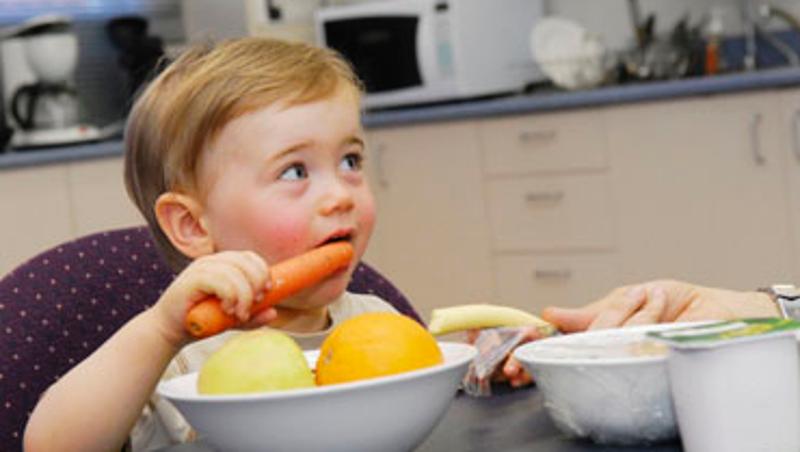
Children's food preferences are well developed by age five, leaving parents a short time to establish positive eating habits for life, according to a Queensland University of Technology health researcher.
QUT nutrition researcher Professor Lynne Daniels said regularly giving babies even small amounts of sweet, fatty or salty foods could contribute to them learning to prefer these over nutritionally valuable foods.
However, Professor Daniels also said the way we fed children was just as important as what we fed them in terms of teaching children to respond to hunger.
"A lot of people think all we need to do to form good eating habits is ensure children have a high exposure to fruit and vegetables," Professor Daniels said.
"But you know how it happens in families; someone gives baby a taste of an ice-cream, a sip of soft drink or a bite of a piece of cake.
"These small amounts might not be so nutritionally important but it is regular exposure. Babies learn to like what they get exposed to and then they eat what they like."
Professors Daniels said a recent survey had shown many parents were not aware of, or were not reinforcing, positive eating behaviours.
"We undertook a survey of 361 mothers of infants aged 12 to 36 months and we asked a range of questions about the way mums were managing early feeding," she said.
Professor Daniels said the survey revealed that many mothers used food to influence children's behaviour or mood, and frequently misread babies' signals.
"For example, we know children may need to be offered new foods about 10 times or more before they become familiar enough with the food to accept and like it. Only a third of mothers surveyed did this regularly," she said.
She also said it was common for mothers to offer food rewards and to encourage children to eat more after the child had signalled that they have had enough.
"If a child refuses food they're familiar with and usually eat or does not finish their meal, the appropriate response is to accept they are no longer hungry and take the food away, but only a third of mothers were doing that regularly."
The survey also found 25 per cent of mothers at least sometimes offered food if their child was bored, and around one third when a child was upset or to keep their child occupied. Almost half the mothers at least sometimes used food as a reward for good behaviour.
"This emotional use of food is not related to hunger and satiety. In fact it is undermining a child's ability to self-regulate and know to eat when they are hungry and not to eat when they're not."
Professor Daniels said she felt parents demonstrated these feeding practices because they had been handed down through family and cultural traditions "almost as secret women's business" from a time when there was concern about children getting adequate nutrients.
"Now a major threat to child and nutritional health is too much food and we need a new approach to early feeding."
Professor Daniels is embarking in 2008 on a joint study into positive feeding practices in early childhood, with Flinders University in South Australia. The study, 'Feed well; Grow well', is funded by the National Health and Medical Research Council.
The project will work with 830 first-time mothers, sourced through maternity hospitals in Brisbane and Adelaide, to investigate the impact of nutrition education and peer-support on feeding practices.
Media contacts:
Rachael Wilson/Carmen Myler, QUT media officers - 07 3138 4494.


